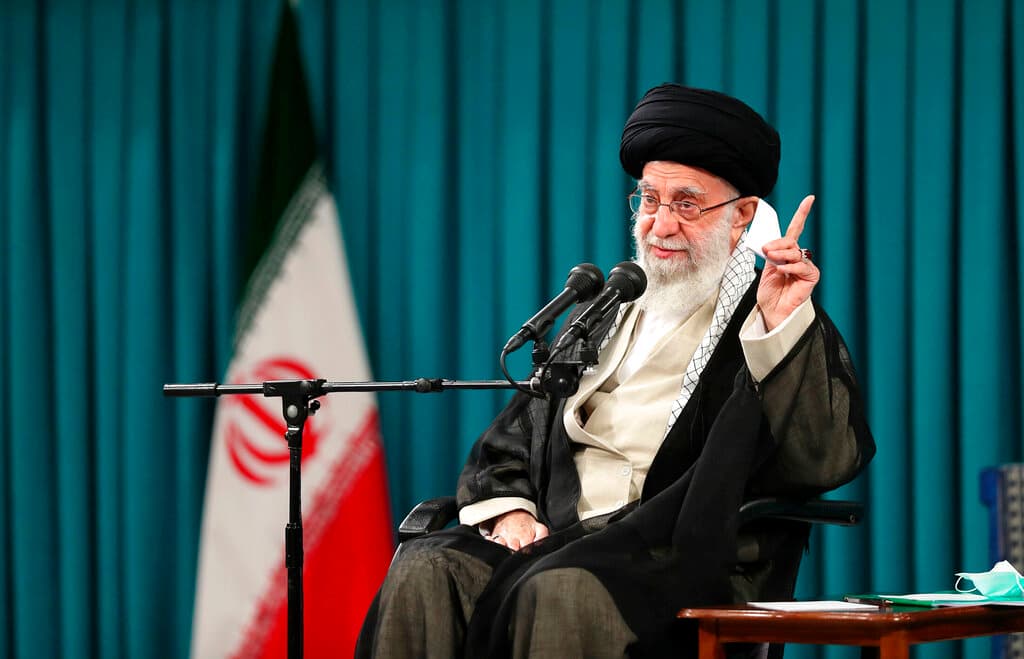As Iran’s Faux-Democratic Presidential Election Looms, All Eyes Are on the Islamic Republic’s Supreme Leader
Ali Khamenei, who will be 89 years of age at the end of the next Iranian president’s four-year term, hand-picked the six candidates in the race, the winner of which could become Khamenei’s heir or at least be in position to greatly influence the succession.

The Islamic Republic’s supreme leader, Ali Khamenei, will be 89 years of age at the end of the next Iranian president’s four-year term. Will the winner of Friday’s rigged presidential contest become Mr. Khamenei’s heir, or at least be in position to greatly influence the succession?
Six men were hand-picked by Mr. Khamenei to participate in Iran’s faux-democratic presidential election. The two most important attributes the supreme leader had in mind when approving the candidates seemed to be blind adherence to the Islamic revolution’s tenets, and ensuring the continuation of Mr. Khamenei’s legacy.
Friday’s presidential election, originally scheduled for 2025, was forced by the May 19 demise of President Raisi, who died in a helicopter crash while traveling to Tehran from Azerbaijan. Eighty candidates attempted to enter the race, but a Khamenei-led body approved the participation of only the six men.
“This is an election to see who can best continue Raisi’s legacy of carrying water for Khamenei, it isn’t about who can change the Supreme Leader’s legacy,” an Iran watcher at the Foundation for Defense of Democracies, Behnam Ben Taleblu, tells the Sun. The regime is well aware of its current fragility, he adds, “so they’re in the business of minimizing shocks to the system.”
In recent years, the supreme leader has managed to consolidate all instruments of government under his control. Various bodies that constitute the Islamic Republic — the judicial, the internal police and enforcers of Islamist codes, the military, the Islamic Revolutionary Guards Corps — are tightly controlled by Mr. Khamenei’s office to ensure no deviation from his dictates.
Foreign policy, regional aggression, quashing any sign of public rebellion — all are directed from the top. So is the Guardian Council, the body charged with approving candidates for office.
Yet there might be a hitch in the plan: If none of the candidates wins more than 50 percent of all votes cast, a runoff contest between the top two vote getters will take place next month.
Following a record low turnout of no more than 41 percent of eligible voters who participated in a parliamentary election in March, Mr. Khamanei can hardly afford additional humiliation. Two presidential election rounds are hardly ideal, which raises a lot of speculation that one or more of the six approved candidates will withdraw from the race before Friday, consolidating the candidacy of a favored man.
The likely favorites are the current speaker of parliament, Mohammad Bagher Ghalibaf, and a former nuclear negotiator, Saeed Jalili. Another candidate, Mostafa Pourmohammadi, could emerge as a dark horse. He is the only cleric among the contestants, which might count for something in a clerical, theology-based Shiite regime.
Mr. Ghalibaf, the speaker, is widely seen as the can-do candidate. He is known for his high-level organizational skills, ruthlessness, and military credentials, including as commander of the IRGC air force. He is also seen as corrupt: public outrage erupted in impoverished Iran in April when the speaker’s wife, daughter, and son-in-law returned from a lucrative shopping spree at Istanbul.
While ordinary Iranians might disapprove, the reputation involving corruption could favor Mr. Ghalibaf in the eyes of the IRGC, which derives much of its power and fortunes from ties with corrupt politicians. Yet, Mr. Khamenei may suspect the speaker of lacking the necessary “zeal” and of harboring an independent streak that might endanger the aging leader’s legacy, Mr. Ben Taleblu says.
Mr. Jalili, in contrast, is “like an old Soviet diplomat,” Mr. Ben Taleblu adds. He is a firebrand who spews regime slogans, but not much of a manager. That might turn him into a favored candidate for Mr. Khamenei, who prefers a non-threatening zealot at his side.
The supreme leader’s office might push either Mr. Ghalibaf or Mr. Jalili to drop out before Friday. Yet, as both men are well known for harboring larger than life egos, such an outcome is unlikely. Meanwhile, voters are increasingly uninterested in well-orchestrated sham elections, and are likely to shun the ballot altogether.
This leaves Mr. Khamenei as the ultimate arbiter. Iran watchers are loath to derive his preferences from reading tea leaves. Yet, “the conversation over the presidential election cannot be divorced from the succession conversation,” Mr. Ben Taleblu says.
Whoever holds the relatively weak presidential office at Mr. Khamenei’s death will be well-positioned to compete with members of other regime branches over the supreme leadership. Mr. Khamenei’s calculations as the Friday contest nears are highly influenced by the recognition that his time on earth might be short.

